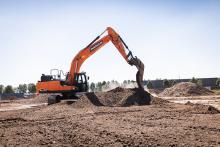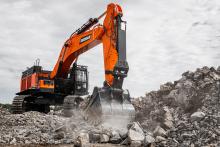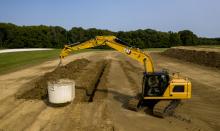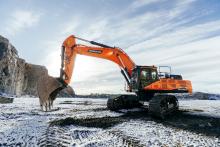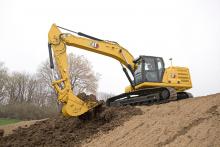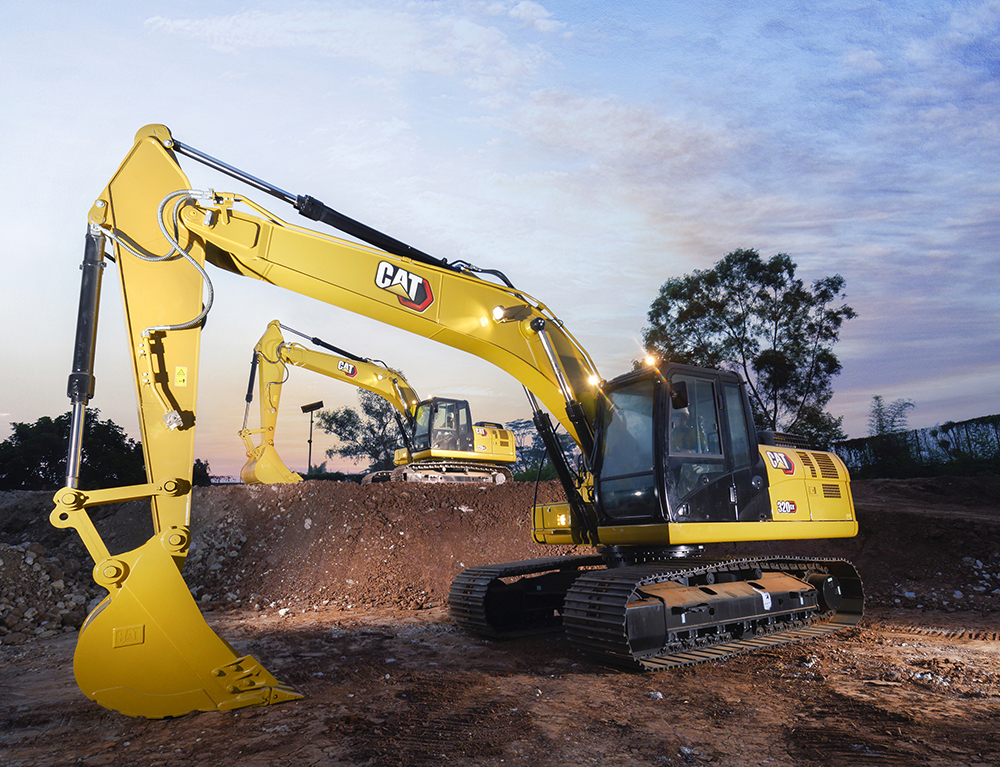
Several major manufacturers are introducing new excavator models offering increased performance over earlier generation units. In addition, firms are also increasing the array of models available to customers to give a greater freedom of choice into the types of machines they buy.
Caterpillar is broadening the range of choices for its customers with the availability of the new 320 GX and 323 GX excavator models for emergent markets such as Africa and Middle East. These two new 20tonne and 21.5tonne machines are available in addition to the existing 320, 323, 326 and 330 Performance models as well as the 320 GC, 323 GC and 330 GC models.
The Performance machines are premium models with additional features aimed at customers looking for maximum productivity and efficiency, as well as a low cost/tonne in a high production environment. Meanwhile, the GC models are standard models that are versatile and suited to most working applications. The GX machines are basic models, without the array of performance modes of the more sophisticated machines and instead are easy to operate and maintain for daily work. With their introduction, Caterpillar is taking aim at a market segment currently filled by lower cost competitors and in which customers would not previously have bought Cat branded products.
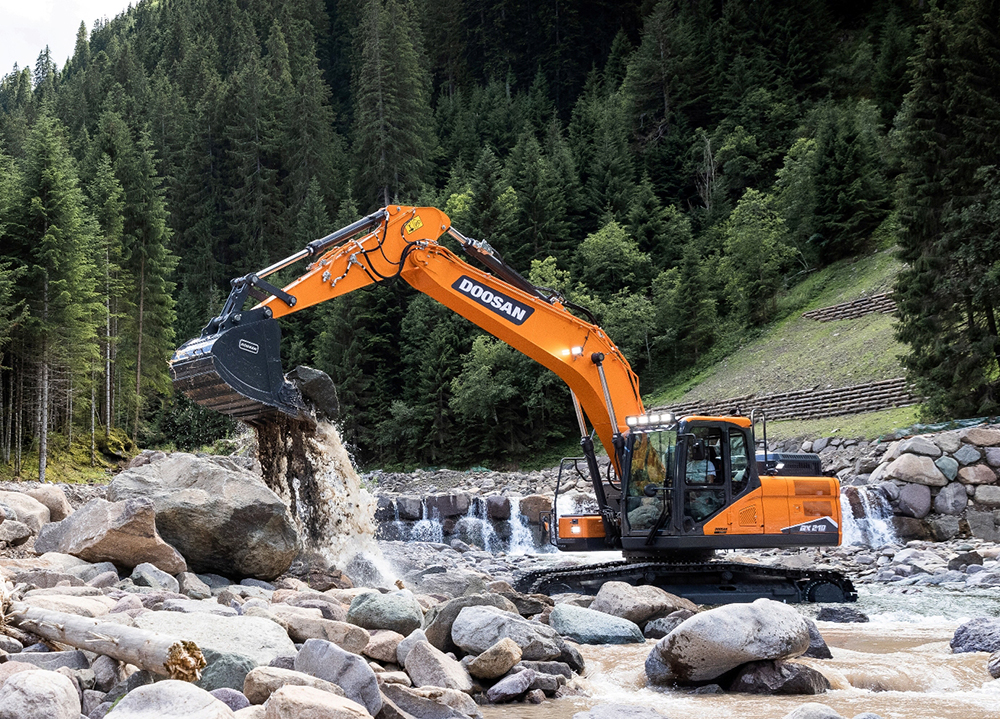
However, while the machines are cheaper to buy, Caterpillar is keen to point out that the three GX machines offer the same quality of manufacture and durability as its other models. Instead, the GX units are aimed at customers wanting faster payback times on capital investment. Customers in the rental market typically want reliable equipment that is inexpensive to buy and run and this is a key target for the three GX units.
Giacomo Bottone is worldwide product director for medium excavators at Caterpillar. He explained, “They have low acquisition and maintenance costs but no compromise on durability.” He added, “They’re basically designed for jobs where the customer needs a bucket or a hammer.”
Jeremy Bombre is Caterpillar’s product marketing consultant for medium and larger excavators in the Middle East. He commented that the GC range is becoming the standard option for customers in the Middle East. However, the GX variants are built on the same next generation platform and are already proving popular for customers in the rental segment. With fewer filters and long service intervals, the GX machines have up to 15% lower maintenance costs than the D2 models being replaced. The firm says that service intervals for fuel filters extend from 500-1,000 hours, while the new hydraulic oil filter improves filtration performance and extends replacement intervals from 2,000-3,000 hours. An auto warm-up feature allows hydraulic warming in cold temperatures to boost component life.
Bombre said that the GX machines are built to the same quality control standards and retain the next generation electro-hydraulics as the other models, but are less costly to buy because they are configured with simpler technology. Operators have the choice of power and smart modes to optimise fuel consumption for the work in hand. The power mode delivers maximum output and productivity, while the smart mode automatically matches engine and hydraulic power to digging conditions to reduce fuel consumption.
These machines are said to be fuel-efficient also, around 15% more economical than the earlier D2 models from the firm. Power for both the 320 GX and 323 GX comes from a Tier 3 compliant Cat C4.4 diesel, with a single turbo variant delivering 104kW in the smaller machine and a dual turbo unit delivering 124kW in the larger model.
Hammer lines are available from the factory as options, while the cabs are said to be spacious and feature touchscreen controls.
Doosan is now offering 21tonne class excavators in three different configurations to suit the different needs of customers. These are available as short, long and narrow or long and wide track models, the new DX210-7, DX210NLC-7 and DX210LC-7 models, respectively. The new DX210-7 short track model suits use on soft ground surfaces where lower ground pressure is required and is a compact unit offering advantages for working in confined spaces and for transportation. The DX210NLC-7 narrow track excavator is aimed at countries such as Italy, where either regulations or customer preferences call for the narrow track configuration. Meanwhile, the new DX210LC-7 machine suits use with rental firms and has a similar long track set-up to Doosan’s heavier DX235LC model.
All three models are powered by the latest generation Doosan DL06V six-cylinder diesel engine, providing 124kW at 1,800rpm. The DL06V engine exceeds the Stage V regulations without exhaust gas recirculation (EGR), using a system that reduces particulates emissions.
This is combined with efficient DOC/DPF+SCR after-treatment to minimise emissions. The new technology means that no maintenance is needed for the diesel particulate filter (DPF) until the machine has operated for 8,000 hours.
The fuel efficiency of the DL06V engine combines with a new hydraulic main valve and the new generation SPC3 Smart Power Controls for fuel savings. There are four power modes available on the new models, which simplify the operation of the new excavators and can be set in both one-way and two-way working modes. The new models use the hydraulic system used on Doosan’s heavier DX225LC-5 model, ensuring a fast response and working precision.
In addition to higher performance and cost savings, the new excavators offer more new features as standard than other machines on the market. The new features include a heavy 4.7tonne counterweight suited for heavier attachments such as tiltrotators and also helps boost lifting and digging capacities.
The excavators have new smart hydraulics that delivers a boost of around 30% in attachment work. The system uses smart hydraulic logic for optimal distribution of hydraulic flow rate when both the arm and attachment are working simultaneously.
There is a new Tiltrotator Mode on the control panel in the excavators, which can be selected to optimise hydraulic flow and helps to maximise the accuracy of tiltrotator work. This is a special two-way flow mode, but it is managed by the Electronic Power Optimising System (EPOS) like a one-way flow mode.
Another standard feature is the fine swing function that minimises the shaking a lifted object undergoes at the start or stop of a swing movement with the excavator. When Fine Swing activates, the overrun disappears, allowing the excavators to reach maximum swing speed smoothly. The system also removes the shock from the turn reversal at the moment of stopping.
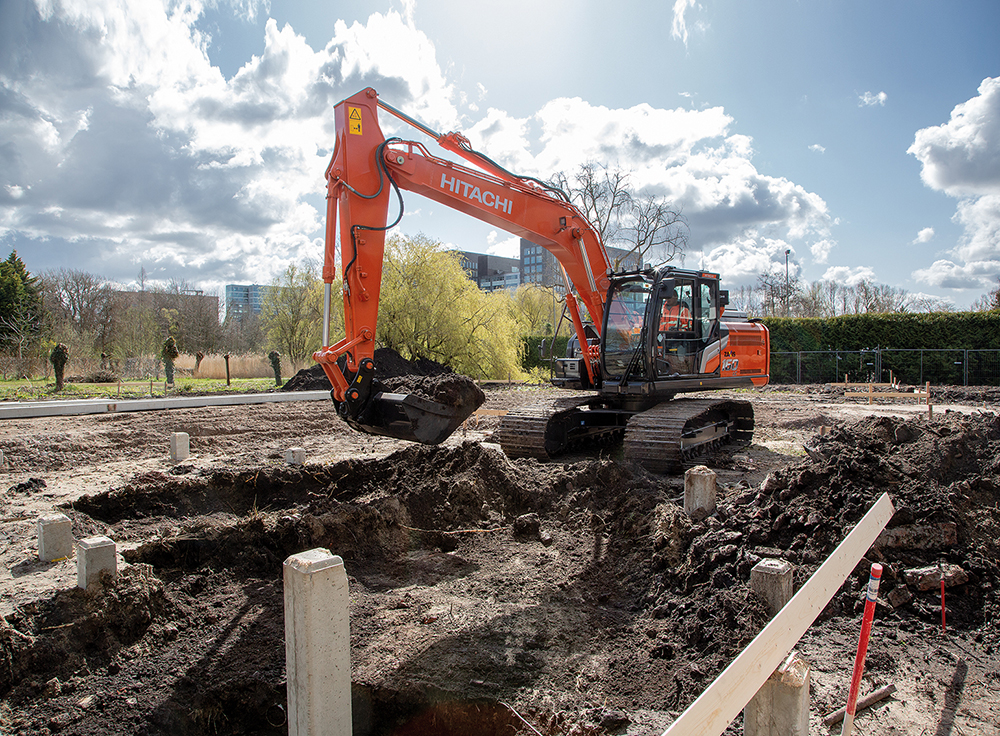
The ergonomic cab features good visibility, a new touchscreen, DAB audio, the keyless Doosan Smart Key, a parallel wiper system, new design pedals and eight LED work lights as standard with an additional four as an option, as well as the optional around view monitor with 360° cameras and ultrasonic sonic detection of obstacles.
Bucket capacities of 0.92m3 are fitted as standard to all three variants. Travel speeds of up to 3km/h can be achieved using the low range and 5.6km/h using the high range.
The new DX210-7, DX210NLC-7 and DX210LC-7 models are factory-installed as standard with Doosan’s state-of-the-art DoosanCONNECT wireless fleet monitoring system. This web-based fleet management solution helps to monitor performance and promotes preventative maintenance.
Meanwhile, Hitachi says that its new ZX160-7 and ZX180-7 medium excavators are Stage-V compliant and offer efficiency and versatility. Hitachi’s sophisticated HIOS IV hydraulic system and improvements made to the travel device result in fuel savings of up to 7%. Operators can control fuel efficiency and reduce costs using the new ECO gauge visible on the colour monitor.
Both models are available with mono or two-piece boom. The ZX180-7 is available with a long undercarriage (LC) for optimal stability and narrow (LCN) for easy transportation. The reduced swing radius of the ZX180-7 also makes it suitable for working in confined spaces, while different attachments are quickly changed using the enhanced attachment support system. Hitachi’s redesigned cab is said to be spacious and ergonomic, with low noise and vibration levels.
To protect operators and the machine from potential hazards, the new excavators offer a good view of the jobsite. The visibility includes a 270° view with the aerial angle camera system. Safety is boosted by the reduced swing radius of the ZX180-7.
A wide range of durable new components have been fitted to the ZX160-7 and ZX180-7, such as improved hose clamps to prevent oil and water leaks, which reduces unscheduled downtime. To further maximise uptime, easy maintenance and cleaning features have been prioritised.
Hitachi offers a wide range of aftersales services, including access to vital data and tools. Remote monitoring systems Owner’s Site and ConSite send operational data via GPRS or satellite from the excavator to Global e-Service on a daily basis. ConSite summarises the information in a monthly email, and the ConSite Pocket app provides real-time alerts should issues arise.
A system continuously monitors the quality of engine and hydraulic oil. Data is transmitted through two oil sensors to Global e-Service. These detect if oil quality has deteriorated, reducing maintenance and unscheduled downtime.

